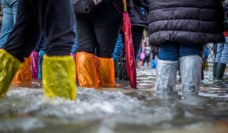“I am heart-broken.” Those were the words of a young Zimbabwean boy recalling the devastation when Cyclone Idai took his home, school, and the lives of beloved friends and family. He is but one story among thousands following the destruction of a storm that claimed the lives of hundreds, injured thousands, and displaced over 160,000 people in March of 2019. Just weeks later, Cyclone Kenneth made landfall in Mozambique, the first time in recorded history that the region has been hit by two tropical storms in the same year.
These disasters are just one example of the human consequences of climate change, which is now considered one of the leading threats to public health worldwide. Such stories are not exclusive to communities abroad. Low-income communities in both high and low-income countries consistently experience the adverse health effects of climate change most vividly. There is a consensus in the scientific community that climate change is real and is caused by human activities. Continuously emerging evidence shows that climate change affects human health in numerous ways. However, two questions haunt many of us: What can I do? And will it make a difference?
Climate change is complex
Climate changes the direct result of our incessant consumption of the planet’s resources. The myriad human health effects of climate change are more difficult to quantify, but strong evidence indicates several direct and indirect consequences. For example, changing precipitation patterns, increases in extreme weather events, and alterations in temperatures lead to lower animal growth rates, crop yield changes, expansion of infectious diseases, and physical, mental, and economic stress in communities. Other regions will become increasingly arid and suffer from droughts, leading to massive wildfires and water scarcity.
Your actions, our collective actions, matter, and how we proceed in our decisiveness for action will dictate the fate of millions. We are responsible for this crisis.
These are just a handful of the many pathways in which climate change can impact the physical, mental, and social health of communities. Unfortunately, these consequences will be exacerbated in low-income nations and communities that have less social, economic, and political infrastructure to cope. Currently, 92% of pollution-related deaths occur in low-middle income countries, who tend to contribute little, if at all, to the climate crisis. This inequity will continue to worsen in the coming years, but we can take action now. The US is the country with the highest emissions per capita, so we have a responsibility to take action.
What can you do?
Given the scope of the climate crisis, addressing the causes of climate change feels overwhelming, particularly as an individual. However, we must not be paralyzed in our own fears and doubts. The truth is that you, even acting alone, can mitigate the effects of climate change. Here are six ways you can help:
1. Have one less child: Having one less child saves 58.6 tons of CO2-equivalent per year. It is the most effective way to reduce your carbon footprint.
2. Buy green energy: The affordability of green energy, or energy from renewable sources, may be out of reach for some families, but for those who can afford it, buying green energy saves 1.47 tons of CO2-equivalent per year.
3. Live car free: Opting for public transportation, walking, and biking save 2.4 tons of CO2-equivalent per year.
4. Vote for candidates that support climate policy: Climate change is highly politicized. Therefore, passing meaningful governmental policies depends on electing officials who are strong on climate and want to curb lobbying by getting money out of politics. Your vote matters.
5. Avoid one roundtrip transatlantic flight: Who doesn’t love traveling? However, avoiding one roundtrip transatlantic flight saves 1.60 tons of CO2-equivalent per year.
6. Educate yourself, friends, family, and community: The first step in fixing a problem is admitting that there is one. Help fight climate denial with facts and tangible steps we can all take to be a part of the solution. Use our interactive StoryMap to find ways to engage your community.
We began this commentary with a story of a young Zimbabwean boy devastated by a cyclone. It can feel far-fetched to make connections between your individual actions and his life. Yet, your actions are connected to him and billions of others around the globe. The World Health Organization estimates that, between 2030 and 2050, hundreds of thousands of people will die each year as a result of climate change. Your actions, our collective actions, matter, and how we proceed in our decisiveness for action will dictate the fate of millions. We are responsible for this crisis. So, how will you choose to pay your climate debt?
Photo by Science in HD on Unsplash















